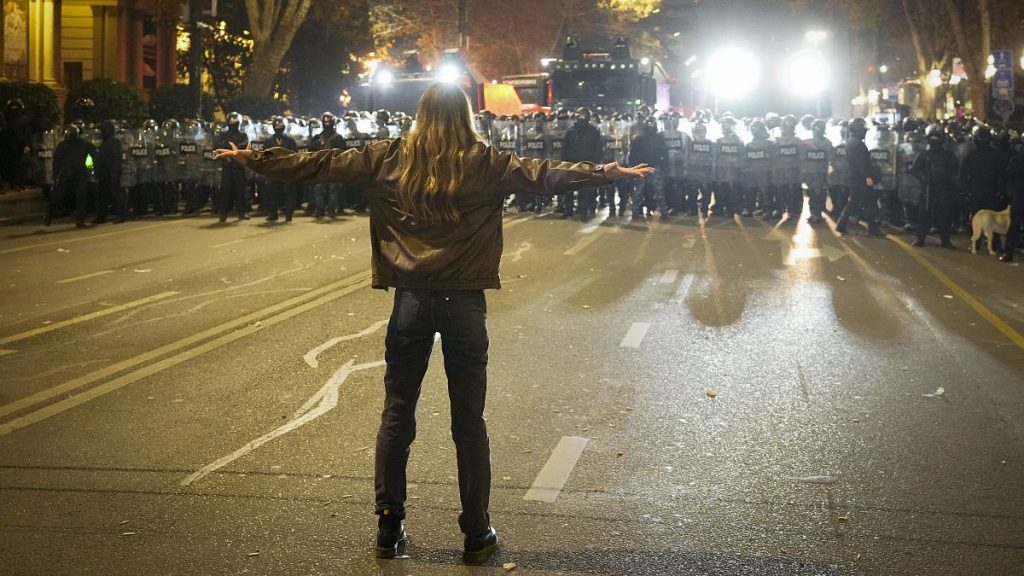Escalating Tensions and Pro-EU Demonstrations in Georgia Spark International Condemnation
Georgia has been embroiled in a wave of unrest for over a week, triggered by the government’s decision to postpone its EU accession talks until 2028. This decision, coupled with existing grievances over perceived democratic backsliding and electoral irregularities, ignited widespread protests across the country, particularly in the capital, Tbilisi. Demonstrators, advocating for closer ties with Europe and expressing their discontent with the ruling Georgian Dream party, have taken to the streets, facing a forceful response from authorities. The ensuing clashes between protesters and security forces have resulted in numerous injuries and hundreds of detentions, including opposition figures and journalists.
The international community has responded with strong condemnation of the Georgian government’s handling of the protests, denouncing the "disproportionate use of force" and calling for respect for fundamental rights. Foreign ministers from Germany, France, and Poland issued a joint statement urging the immediate release of detained opposition members and emphasizing the importance of upholding freedom of assembly and expression. They also called for de-escalation and inclusive dialogue between the government, opposition, and civil society to address the underlying concerns fueling the protests. The United States also voiced its disapproval, with Secretary of State Antony Blinken criticizing the "brutal repression" of pro-European demonstrators.
The current unrest stems from a confluence of factors, including disputed parliamentary elections in October 2020 and the Georgian Dream party’s recent legislative actions perceived as undermining democratic freedoms. The opposition has accused the ruling party of manipulating the election process with alleged Russian interference to maintain power, allegations that the government denies. The subsequent introduction of a "foreign influence" law, modeled after similar legislation in Russia, further fueled concerns about democratic backsliding and raised alarm bells within the EU.
The European Parliament, critical of the electoral process and the perceived erosion of democratic norms in Georgia, issued a resolution that added fuel to the fire. This resolution, which criticized the Georgian Dream party for the country’s perceived "democratic backsliding," prompted the ruling party to suspend EU accession talks – a decision that directly ignited the current wave of protests. The postponement of these talks, seen as a setback for Georgia’s European aspirations, served as the catalyst for the widespread demonstrations and escalated the existing tensions between the government and pro-European factions within the country.
The contentious "foreign influence" law, which requires organizations receiving over 20% of their funding from abroad to register as “agents of foreign influence,” has drawn significant criticism for mirroring similar legislation used by Russia to suppress dissent and restrict civil society. Critics argue that this law is a tool to stifle independent voices and curtail freedoms of expression and association, pushing Georgia further away from European democratic norms and values. The law, seen as a key indicator of the government’s increasingly authoritarian tendencies, has intensified concerns about the country’s democratic trajectory and its alignment with European principles.
Georgia’s President, Salome Zourabichvili, a pro-European figure, has publicly expressed her disagreement with the Georgian Dream party on several key issues, including the controversial legislation and the handling of the protests. She has used her position to advocate for closer ties with Europe and has been critical of what she perceives as the government’s authoritarian drift. Her meeting with Ukrainian President Volodymyr Zelenskyy in Paris, where they discussed Georgia’s European aspirations and the ongoing situation, underscores the complex political landscape within Georgia and the international attention focused on the country’s future direction. Zelenskyy’s public support for Georgia’s pro-European movement further highlights the geopolitical significance of the unfolding events.
The situation in Georgia remains highly volatile, with the potential for further escalation. The government’s response to the protests will be closely scrutinized by the international community, particularly the EU, which has made clear its expectations regarding democratic reforms and respect for fundamental rights. The future of Georgia’s relationship with the EU hangs in the balance, with the resumption of accession talks contingent on the government’s willingness to address the concerns raised by the protests and demonstrate its commitment to democratic principles. The coming days and weeks will be crucial in determining the direction of Georgia’s political trajectory and its relationship with Europe.














